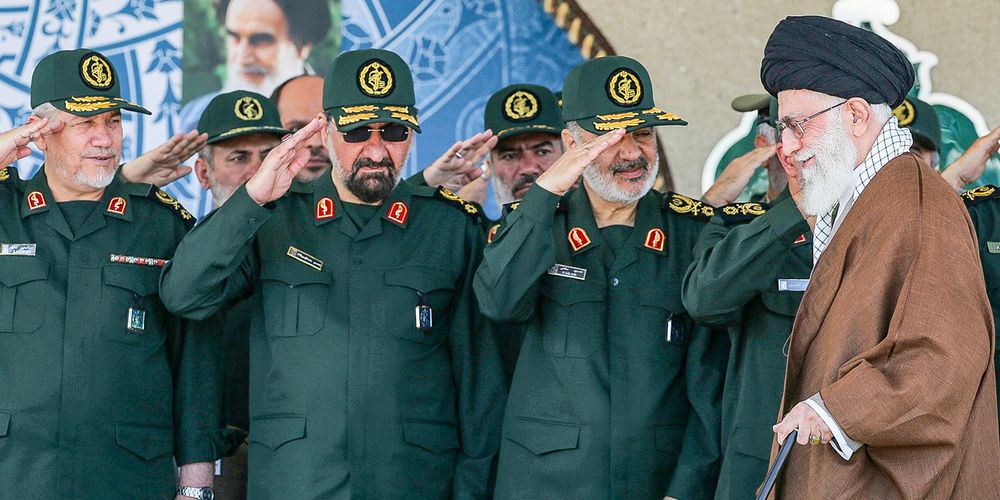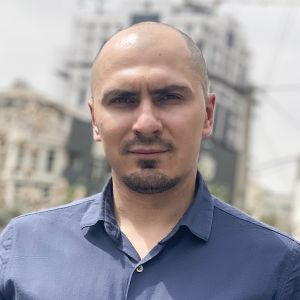Search

Publications
Foundation of the Republic: IRGC and its role in modern Iran

The Islamic Revolutionary Guards Corps (IRGC) is the backbone of the Islamic Republic of Iran and performs an entire set of various tasks. To describe its role and functions, the analysts often use the concept of «a state within a state». [1] Such definition is underpinned by significant autonomy of IRGC, and the fact that this organization duplicates many functions of other government agencies. Moreover, the Corps and associated forces operation becomes the mechanism to engage a significant part of the population into religious and around-religion activities tied with the Iranian spiritual leader. [2]
Security foundation
IRGC was created in 1979 by virtue of the decision of Ayatollah Ruhollah Khomeini, the founder of the Islamic Republic. Its main task was building a new loyal military organization in the post-revolutionary unstable environment. In the context of purges in the old Shah’s army units and mass desertion from the military service, IRGC was designed to become one of the pillars the authorities could lean upon. In accordance with Article 150 of the Constitution, the main task of IRGC is protection of the Islamic Revolution and its achievements.
At present, the Armed Forces of Iran consist of three components: the army, IRGC and law enforcement forces. The IRGC plays the role of elite and the most loyal forces with the best weapons financed as a priority. Like the other elements of the Armed Forces, the Corps coordinates its activities with the General Staff. At the same time, this organization is directly subordinate to the spiritual leader of Iran. The headcount of the army and IRGC is about equal and is estimated at the level of 380 thousand and 320 thousand military servants respectively. [3]
The special role of IRGC fixed in the Constitution allowed it to get a very broad set of functions. The Corps assists the army units to assure the state’s security, supports the foreign allies of Iran, helps the law enforcement units inside the country in case of need, carries out its own intelligence and counterintelligence activities, and guards the top leaders of the Islamic Republic. On top of that, IRGC participates in ideological and social activities of the government and assists with cyber security of Iran.
Finally, the role of IRGC in developing new weapons technologies and upgrading the existing ones is equally important. Thus, the media mentioned several times the research center of the aviation industry «Shahed» developing the unmanned aerial vehicles (UAVs). It is also indicative, that after a series of failures of the civilian agencies of Iran in the space program, this sphere was also assigned to IRGC. It resulted in space air forces of IRGC launching two satellites in 2020 and 2022.
The special forces unit called «Qods» («Jerusalem» in Persian, another common name is «Al-Quds» in Arabic) is widely knows, it is often mistakenly believed to be a version of «Spetsnaz», the Russian Special Operation Forces). In fact, this is a specialized intelligence service with the headcount of 10-20 thousand people in charge of promoting indirect influence of Iran in the region and solving special external policy issues. Thus, Qods assisted in establishing the pro-Iranian groups in the Middle East including Hizballah in Lebanon, Popular Mobilization Forces in Iraq and People’s Defense Units in Syria; and still coordinates their activities. Qods was at the front pages of global media after the USA killing its commander-in-chief Quasem Soleimani in Baghdad with a missile strike on 3 January 2020. Despite his special role in operating this special organization, the Qods activities did not undergo any substantial change after the killing of its legendary chief.
People’s volunteer forces
The volunteer forces «Basij» (Resistance Mobilization Force) plays a special role contributing to expansion of IRGC functions. This movement embodies the concept of Ayatollah Khomeini – «the Islamic army of 20 million». About 100 thousand of Basij representatives are career officers within IRGC. Other than that, this is a separate volunteer organization included into IRGC, which plays the role of youth patriotic organization, the Corps’ succession pool, an additional force for assuring the state security and auxiliary reserves for solving military tasks.
The Basij headcount estimates vary significantly depending on the source. Usually, the provided number is between 2 and 4 million people. [4] The total number of Iranian population is about 80 million people. In other words, Basij is an instrument of mass involvement of citizens into the operation of the state security agencies. It is important to understand that the major part of Basij activities does not belong to the military sphere. For example, the organization organizes the distribution of humanitarian aid, helps the rescue service in case of emergencies such as earthquakes and deluges, restores the damaged infrastructure, builds dams, etc. Hence, IRGC through Basij becomes one of the key players in delivering social aid to Iranian citizens.
On top of all that, Basij is active in cultural promotion of the Islamic revolution values. Today, operations in cyber space are added to traditional outreach on schools and mosques. The very existence of such numerous organization loyal to the government helps to promote the Islamic ideals, because Basij representatives are found everywhere across the entire country.
Economy and politics
The most important reason for IRGC to have such a special position in Iran is the financial autonomy of the organization. In fact, in addition to the funds allocated by the government for the national defense within the country’s budget, the Corps has many parallel sources of funding.
From the very beginning, IRGC was established as a military organization, and was not meant to participate in economic and political life. The situation started to change after the end of the war between Iran and Iraq (1980-1988), when the Islamic Republic needed to restore the destroyed infrastructure. This task was assigned mainly to IRGC.
After that the IRGC participation in the economic activities was only growing, and the authorities fostered it at certain stages. Thus, Ali Akbar Hashemi Rafsanjani, the President of Iran from 1989 until 1997, believed, [5] that engaging IRGC in the economic activities will reduce the political ambition of the organization. However, after receiving the financial assets, the Corps started its even deeper integration into political processes. The new milestone was privatization of the state property during the presidency of Mahmoud Ahmadinejad (2005-2013). IRGC became the owner of the significant portion of the privatized assets. [6]
President Hassan Rouhani (2013-2021) tried to take an opposite course and to limit the extent of IRGC participation in the economy. [7] However, he failed to achieve any meaningful progress in this. One of the reasons was the increased pressure of the US anti-Iranian sanctions during Donald Trump being in office. IRGC is one of the key forces in the Republic engaged in developing various schemes to bypass the Western sanctions. Eventually, Trump’s policy ended up by enforcing the meaning of the Corps for the Iranian economy.
There is no official statistics about the IRGC share in the economy of Iran. Most often the Western sources estimate that the Corps may be in control of up to 1/6 of Iranian GDP. [8] First of all, the groups associated with IRGC have assets in construction, oil-and-gas, financial, banking and telecom sectors. Khatam-al Anbiya corporation is believed to be the key proxy for financial interests of IRGC.
The main objective of the financial activities of the Corps is the control over the strategically important sectors of the economy. At the same time, these activities may be qualified as a special method of Iranian social policy. IRGC is not just doing business, it is creating numerous jobs including those in the problematic regions of the country. In other words, the Corps may be called the major social entrepreneur in Iran.
IRGC is one of the key political players in the country, even though the Iranian military servicemen do not participate in politics and do not demonstrate open support of any political force. However, many of the leading Iranian politicians came from the Islamic Revolutionary Guards Corps. The former Corps members seek election at different levels. For example, Mohsen Rezaee, the IRGC commander in 1981-1997, ran for presidency in 2009, 2013 and 2021, held the position of the Secretary of the Council on the feasibility of the decisions (the advisory body with the spiritual leader of Iran), and after Ebrahim Raisi won the recent presidential race, Rezaee was appointed the Vice-President for Economic Affairs.
The USA officially recognized IRGC the terrorist organization. This was initiated by Donald Trump in 2019. The main reason was the intent of the 45th US President to exclude the possibilities for the following American politicians to mend the relations with Iran. This decision also allowed for expanding the sanctions. The United States may accuse the foreign companies dealing with Iranian partners of connections with IRGC, because the Corps has deeply penetrated the Iranian economy in all the spheres.
We can say that Trump’s forethought proved to be correct to a great extent. In fact, the position of Joe Biden’s administration (which refuses to exclude IRGC from the list of terrorist organizations) is the key barrier today for resuming the Iranian nuclear deal. Such exclusion is the key requirement of the Iranian party at the nuclear deal negotiations.
It is unlikely that Biden, as well as the US Democrats in general, was enthused by Trump’s decision to include IRGC into the list of terrorist organizations in 2019. This decision strongly complicates the potential dialogue with Teheran. However, excluding the Corps from this list today means significant political risks for the Democratic Party. IRGC does not deny its anti-American position, so the Republicans will immediately use such step on behalf of the current administration to criticize Biden for his excessive gentleness and impairment of the US national interests.
1. Sazhin V. Islamic Revolutionary Guards Corps – a state within a state. Global transformation contours. 2017. v. 10, ¹3. p. 83-109.
2. Smagin N. On guard of the Islamic Republic: IRGC and Basij in the Iranian security system. Armies and security in the Middle East and North Africa. Moscow, RIAC, 2019, p. 70-79.
3. Lyamin Yu., Pukhov R. (ed.). Persian rampart, Moscow, 2019. http://cast.ru/books/persidskiy-bastion.html
4. Golkar Saeid. Paramilitarization of the Economy. The Case of Iran's Basij Militia. Armed Forces and Society. 2012. Volume 38, issue 4. pp. 625–648.
5. Hesam Forozan, Afshin Shahi, The Military and the State in Iran: The Economic Rise of the Revolutionary Guards. The Middle East Journal, volume 71, ¹1, winter 2017.
6. Afshon Ostovar, Vanguard of the Imam. Religion, Politics, and Iran’s Revolutionary Guards, Oxford University Press, 2016.
7. Islamic Revolutionary Guards are deprived of business. Kommersant. 14.09.2017.
8. Parisa Hafezi and Louis Charbonneau, «Iranian Nuclear Deal Set to Make Hardline Revolutionary Guards Richer», Reuters, July 6, 2015.







